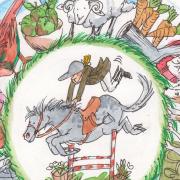By putting communities back in touch with nature the Federation of City Farms and Community Gardens has seen some astonishing results at their various projects across Dorset and, with support from the Prince’s Countryside Fund, they are hoping to take their work to a whole new level

“My husband tells me that when we first moved back to Dorset with our children I stated that I wanted to turn that playground into something more attractive that people would want to use,” said former chair of the Federation of City Farms and Community Gardens (FCFCG) Clare Sutton. The playground in question is now a thriving community playground at the heart of Chapelhay in Weymouth, and the days of its rather tired and unloved appearance pre 2006 are long forgotten. It is one of many community-run spaces across the county that local residents have come forwards to take ownership of and care for, even getting their hands muddy along the way.
“Setting up projects like these is all about empowering people to make small changes to the places that they live in, and we found that by improving the physical aspect of a community it began to improve other aspects of life there,” explained Clare. “The integration you see as a result is fantastic; I just love the way that a project like this brings people together and it doesn’t matter what sort of background you come from, which was something I found very interesting being on the board of the Federation of City Farms and Community Gardens for 15 years.”
Having taken on a new job with Poole Housing Partnership Clare decided to utilise the tried and tested method of encouraging communities to become green fingered. So she began helping residents and the wider communities to set up local food-growing projects to expand the FCFCG network further. One of the biggest success stories for Clare has been the community garden at Turlin Moor in Poole.
“We put the first spades in the ground in May 2012 and it is now thriving against all the odds,” she said. “We work closely with the local school, youth club and the children’s centre and the project is now largely run by the local community. It’s right at the heart of the community, so if you go there you can’t fail to notice that they have a community garden.”

Before they started the project Clare and her team walked around the estate to talk to the residents about what they were planning. “Quite a lot of people said that they didn’t think that it would work, that it would get vandalised or people wouldn’t get involved. We took a calculated risk and it has been brilliant; the way the community has rallied around to get the project off the ground could not have been further from what was predicted.
“People don’t even have to be interested in gardening or growing vegetables to get involved. At Turlin Moor there’s one man who helps at the garden who isn’t interested in gardening at all, but he is a carpenter so has been able to put his skills to use making things for the garden, such as the bins.
“Now we get people coming to the garden and leaning on the fence saying they think it’s fantastic what we’re doing here. You just have to put faith into people and trust that it will all work out, and hopefully they will then open the gate and want to get involved. Growing plants and vegetables is the means of bringing a community together, but it is by no means the end.”
But it is not just urban areas that are benefitting from being at one with nature. Longmead Community Farm is a small charitable venture in Milborne St Andrew run mainly by volunteers that helps vulnerable families rebuild their lives and overcome serious problems such as family break-down, poor health and depression. The aim of the farm is to provide a structured, farm-based activity of programmes, typically residentially over a weekend, so that families can find their own positive solutions to issues that they may be facing, while building relationships and modelling behaviour, all the while feeling valued through making a positive contribution to the Longmead project.
Steve Beech is the manager at Longmead Community Farm and has seen the positive impact the farm has had: “We try not to have the sense of us and them; we invite families that may be experiencing a critical time to join in with our work at Longmead so that they can feel a part of the work we are carrying out on the farm.
“Sometime social problems in rural areas can be overlooked; larger towns and cities tend to be the focus of funding initiatives to improve things, but that doesn’t mean that there aren’t similar issues in rural areas.” Short residencies are offered at Longmead, as well as regular follow-up visits. As Steve explains giving people a break away from their normal environment can be a real benefit. “Often they have no idea about life in the country, even if they do come from a rural area. There are so many benefits of working with animals and the farm environment, which people are now starting to take quite seriously in this country. In the past I think these benefits have been underestimated.”
The farm has enjoyed notable success since its founding in 2005.Now there is a team of more than 30 volunteers helping out with the project, including some who first came to the farm in a time of crisis themselves and decided to stay on and help others in a similar situation.
“Putting people in a new environment and getting them active brings about completely different behaviour,” explained Steve. “We make sure that people eat well and there is lots of social engagement as well as working with the animals, which has been known to improve depression and mental health. It improves health too as you’re physically active so you sleep well. Some of the feedback we get from social services is that there are significant improvements in school attendance for children, people are less angry and anti social behaviour drops while their own self esteem improves. The balance of creativity and hard graft is a tremendous way of working and has a real and positive impact upon peoples’ lives.”
If supporting projects like these all across the county wasn’t enough, the FCFCG is widening its net after being awarded a grant from the Prince’s Countryside Fund to kick-start a Schools Farm Project where pupils will be able to experience rural life first hand alongside their normal school day. With six schools from across the county already signed up to establish their own farms, FCFCG assistant CEO Ian Egginton-Metters is confident that it is going to be an initiative that proves popular.
Ian, who was awarded an OBE in the New Year Honours list for his contribution to city farming over the last 30 years, believes that the farms will become an invaluable teaching aid in explaining how things grow. “There are 1001 benefits to the project,” he said. “It allows pupils to think about all the problems on a farm and experience ways of dealing with them. It’s a fantastic opportunity to engage people, and we have already seen at other school farms how enthusiastic the pupils are about getting involved. They even come in early to help muck out the animals before school starts.
“We see the same enthusiasm with the community farms and gardens. Once you go through the gate it doesn’t matter what your experience is or your status in life. People build up skills and confidence which they then take out into the community and apply to all aspects of their own lives.”
--------------------------------------------------------------
The Federation of City Farms and Community Gardens
The Federation of City Farms and Community Gardens (FCFCG) supports, represents and promotes community-managed farms, gardens, allotments and other green spaces, creating opportunities for local communities to grow. Working with these community groups the FCFCG aims to better communities across the UK in both urban and isolated rural areas by empowering local people of all ages, backgrounds and abilities to build better communities, often in deprived areas, and to make a positive impact on their surrounding environment.
For more information on the FCFCG visit farmgarden.org.uk, call 0117 923 1800 or email admin@farmgarden.org.uk.
--------------------------------------------------------------
How the Prince’s Countryside Fund is helping rural communities on the flooded Somerset Levels
The Prince’s Countryside Fund has announced it will donate £50,000 from its emergency fund to help farmers and rural communities in Somerset. The Duke of Westminster has generously confirmed he will personally match the funding and donate an additional £50,000 taking the total available to £100,000. The Prince’s Countryside Fund has allocated £25,000 of the emergency funding to The Farming Help Partnership (The Royal Agricultural Benevolent Institution (RABI), Farm Community Network (FCN) and the Addington Fund), a further £25,000 has been given to Somerset Community Foundation.
Somerset Community Foundation will use the funding to provide emergency relief grants to small businesses and individuals affected by the flooding, helping to compensate for loss of income, damage of shop stock and the increased petrol costs of simply getting the children to school on extended daily commutes. But as Paul Burrows, Chief Executive, RABI explains they are all aware that the total costs of the severe weather are yet to be counted. “We’re anticipating more requests from the farming community in the coming months. Flooding causes huge devastation on property, land and the morale of communities, and once flood waters recede and the media attention wanes, people still need help to recover.”

























